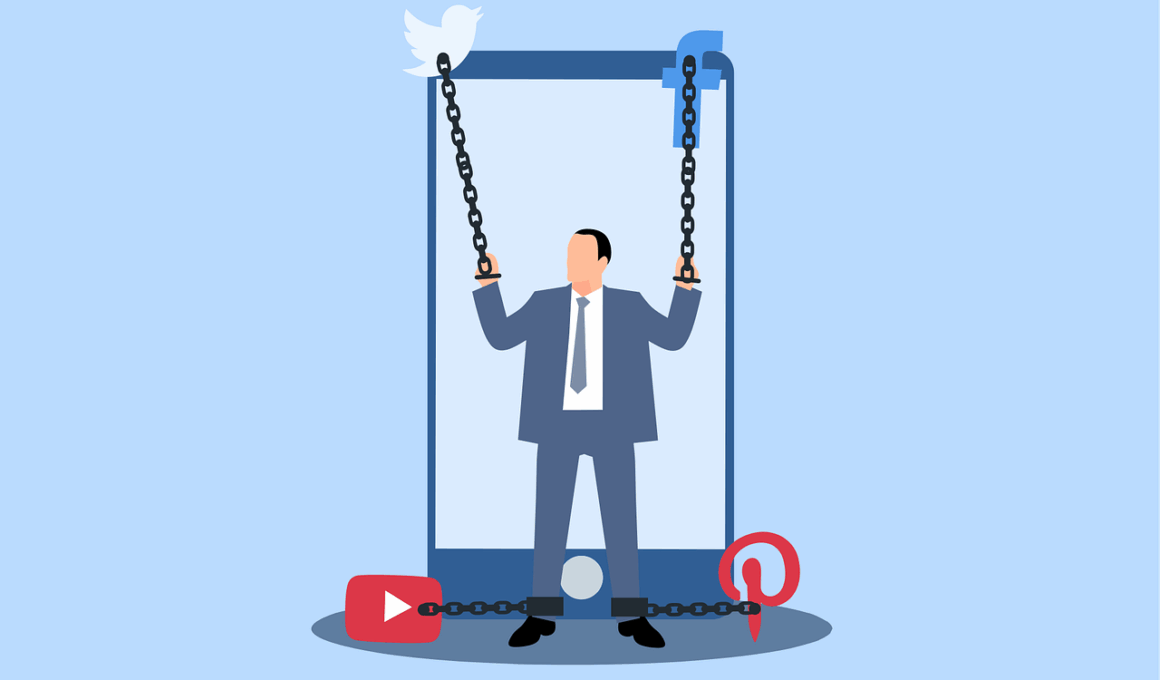Social Media Addiction and Its Mental Health Consequences
Social media has undoubtedly transformed the way individuals engage with one another, yet its excessive use can lead to addiction. This addiction can significantly detract from one’s mental well-being. Many studies show that prolonged usage of platforms such as Facebook, Instagram, and Twitter can lead to feelings of loneliness and isolation. Users may experience anxiety and depression due to the constant comparison with others, which can affect self-esteem. Furthermore, the phenomenon of cyberbullying exacerbates these issues, causing emotional distress to many individuals, especially among the youth. Social media platforms often provide a façade of happiness that can lead users to feel inadequate or unworthy. Consequently, they might spend even more time online to escape reality, creating a vicious cycle. Although social media offers opportunities for connection and support, it’s vital to acknowledge and address the potential mental health consequences that stem from its misuse. By recognizing these issues and implementing healthier social media habits, individuals can mitigate the adverse effects and enhance their overall well-being.
Research has shown a correlation between excessive social media use and negative mental health outcomes. Increased screen time can affect sleep patterns, contributing to heightened levels of stress and anxiety. When individuals engage in late-night scrolling, they interrupt their sleep cycles, which can lead to fatigue and irritability during the day. Moreover, constant notifications can create a sense of urgency that prevents users from fully engaging in real-life experiences. In turn, this can lead to decreased productivity and a decline in overall quality of life. Studies indicate that social media can expose users to toxic positivity, where they feel pressured to portray an unrealistic ideal of happiness. Such experiences can trigger feelings of inadequacy among users who struggle to meet these standards. Therefore, it is crucial to strike a balance between online engagement and real-life activities. This balance includes setting specific times for social media usage and being mindful of the content consumed. Adopting a healthier approach can help individuals harness the benefits of social media while minimizing negative impacts on mental health.
Coping Strategies for Social Media Addiction
To combat social media addiction and its mental health effects, various coping strategies can be employed. For starters, individuals can practice digital detoxes, allowing themselves designated periods away from screens. This break enables them to reconnect with themselves and their surroundings, fostering mindfulness. Additionally, setting specific time limits for social media use can help create a structured routine that prioritizes real-life interactions over online engagement. Moreover, adopting healthier habits, such as engaging in regular physical activities, can alleviate symptoms of anxiety and depression associated with excessive social media use. Activities like yoga, walking, or even dancing can elevate moods and reduce stress levels. Furthermore, it’s paramount to cultivate a supportive social circle, where friends and family encourage healthy behaviors. Communicating openly about feelings regarding social media can lead to shared understanding and collective efforts toward healthier usage. Lastly, seeking professional help from counselors or psychologists can provide valuable insights and coping mechanisms for those struggling with severe social media addiction. Through these methods, individuals can regain control over their mental health and foster a more balanced online presence.
Another effective strategy in mitigating the impact of social media on mental health is to curate one’s online environment carefully. This includes unfollowing or muting accounts that induce negative feelings, such as envy or self-doubt. Individuals should surround themselves with content that promotes positivity, motivation, and inspiration. Following mental health advocates or communities that focus on self-growth can provide a supportive atmosphere online. Additionally, engaging actively rather than passively consuming content can also reduce feelings of isolation. Posting personal experiences and engaging with others can foster connections rooted in reality. This engagement allows individuals to realize they are not alone in their struggles. Furthermore, educating oneself and others about the effects of social media on mental health can raise awareness and reduce stigma. Encouraging discussions around mental health issues can foster a more understanding and supportive online community. Ultimately, proactive steps toward creating a healthier relationship with social media can lead to a significant improvement in one’s overall mental health. Making conscious choices can empower individuals to transform their social media experience into a more positive force in their lives.
The Role of Education in Promoting Healthy Use
Education plays a key role in promoting healthy social media use and addressing the mental health implications associated with it. By integrating digital literacy into school curriculums, students can learn how to navigate the online world responsibly. This education should encompass understanding the impacts of social media on mental health, promoting critical thinking about the content they encounter, and encouraging self-reflection regarding their online behaviors. Workshops and seminars led by mental health professionals can offer insights into establishing healthy boundaries and improving online interactions. Additionally, schools can provide resources for students who might be struggling with their mental health due to social media. By fostering an environment where mental health discussions are encouraged, students will feel supported and understood. Furthermore, parents can also play a critical role by engaging in conversations about social media use with their children. Open discussions lead to transparency and allow children to express their concerns or struggles. Ultimately, a collaborative approach between educators, parents, and community members can equip the younger generation with the tools to handle social media use responsibly, promoting mental well-being.
Furthermore, the workplace can implement policies that address social media use, recognizing its potential impact on employee mental health. Promoting a culture of mental well-being within organizations can significantly enhance employees’ overall job satisfaction and productivity. Businesses can organize training sessions focused on digital well-being and stress management techniques. Implementing flexible work hours can also encourage employees to prioritize their mental health by allowing them to step away from screens. Moreover, businesses can encourage employees to take regular breaks and engage in activities outside of work, fostering a more balanced lifestyle. Peer support groups within the workplace can also be beneficial, where employees can discuss their feelings regarding social media pressures openly. By creating an understanding and supportive work environment, employers can mitigate the adverse effects of social media. Ultimately, prioritizing mental health in the workplace not only benefits employees but also cultivates a more engaged and productive workforce. Recognizing the relationship between social media use and mental health is paramount for fostering an environment that encourages balance and well-being.
Conclusion: The Importance of Balance
In conclusion, while social media serves as a valuable tool for connection and communication, its potential for addiction and adverse mental health consequences cannot be overlooked. Striking a balance between online engagement and real-world experiences is essential to maintain mental well-being. By employing effective coping strategies, educating ourselves and others, and fostering discussions about mental health, we can mitigate the negative effects associated with social media use. It’s crucial to continuously assess our relationship with social media, ensuring it enhances rather than detracts from our lives. Adopting healthier habits, curating our online spaces, and implementing supportive practices in schools and workplaces can empower individuals to navigate the digital landscape effectively. As we move forward in this digital age, prioritizing mental health will become increasingly important. Recognizing signs of distress and taking action towards a healthier relationship with social media is vital for ourselves and those around us. With ongoing collective efforts, individuals can transform their social media experience into a source of positivity and support, ultimately fostering better mental health outcomes.


